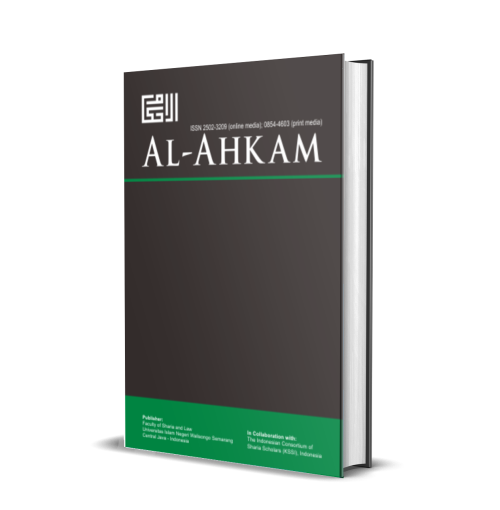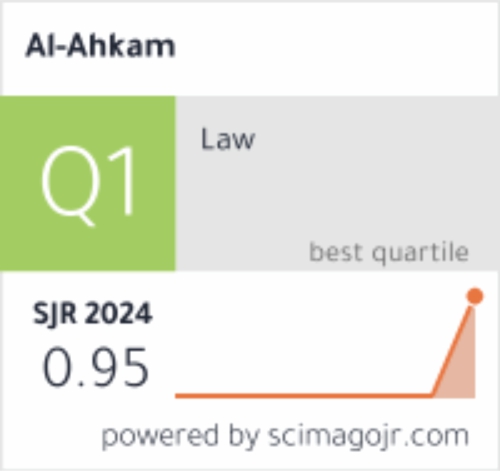The Position of Expert Witnesses in Medical Malpractice Cases in Indonesia
DOI:
https://doi.org/10.21580/ahkam.2018.18.1.2306Keywords:
position, expert witness, medical malpractice cases, IndonesiaAbstract
Medical malpractice is one of the most difficult professional errors to prove. In solving medical malpractice cases, law enforcement is always assisted by doctors by connecting experts to reveal the truth with their expertise. The position of doctors as experts is very important and strategic. However, it is not easy for a doctor who wants to become a expert witness because the relationship of the suspect is a colleague. If the doctor want to be an expert witness then his testimony in court is not objective or impressed protect his colleagues. This study suggests that in the completion of medical malpractice cases in court can apply the system of proof by changing the proof to the doctor. In addition, this study also suggests to resolve medical malpractice cases that can be solved through the way of mediation before pursuing litigation settlement. In the aspect of Islamic law, the position of expert witness (ra`yu al-khābir) is very important to explain or interpret a case that is vague and difficult to prove. However, an evidentiary system unable to prove the medical malpractice case then Islamic law can justify by using other methods that can bring benefit in general.
[]
Malpraktik medik adalah salah satu kesalahan professional yang sangat sulit dibuktikan. Dalam menyelesaikan kasus malpraktik medik, penegak hukum selalu dibantu oleh dokter sebagai saksi ahli untuk mengukapkan kebenaran sesuai dengan keahlian yang dimilikinya. Kedudukan dokter sebagai saksiahli sangat penting dan strategis. Namun, tidak mudah mendapatkan dokter yang mau menjadi saksi ahli terhadap tersangka karena saksi ahli dengan tersangka adalah teman sejawat. Apabila dokter mau menjadi saksi ahli maka kesaksiannya di pengadilan dinilai tidak objektif atau terkesan melindungi teman sejawatnya. Penelitian ini menyarankan supaya dalam penyelesaian kasus malpraktik medik di pengadilan dapat menerapkan sistem pembuktian terbalik dengan memindahkan beban pembuktian kepada dokter. Selain itu, penelitian ini juga menyarankan supaya penyelesaian kasus malpraktik medik dapat diselesaikan melalui jalur mediasi sebelum menempuh penyelesaian secara litigasi. Dalam aspek hukum islam, kedudukan saksi ahli (ra`yu al-khābir) sangat penting untuk menerangkan atau menafsirkan suatu perkara yang kabur dan sulit dibuktikan. Namun, apabila sistem pembuktian dengan menggunakan saksi ahli tidak mampu membuktikan perkara malpraktik medik maka hukum islam dapat membenarkan menggunakan metode lain yang dinilai dapat mendatangkan maslahat secara umum.Downloads
References
Abbas, Syahrizal. Mediasi dalam Perspektif Hukum Syariah, Hukum Adat & Hukum Nasional. Jakarta: Kencana Prenada Media, 2009.
American Bar Association (ABA). ABA Model Rules of Professional Conduct. Chicago: American Bar Association (ABA), 2011.
al-’Asqalaniy, Aḥmad Ibn ‘Ali ibn Ḥajar. Bulūgh al-Marām. Beirut: Dār al-Fikr, n.d.
Asser, Cf. W. “Stelplicht En Bewijslastverdeling En Medische Aanspra-Kelijk Heid in Het Nederlandse Recht.” Tijdschrift Voor Gezondheidsrecht 27 (1991).
Australian Medical Association. “Ethical Guidelines for Doctors Acting as Medical Witnesses 2011 (Revised 2016).” Australian Medical Association, 2017. https://ama.com.au/position-statement/ethical-guidelines-doctors-acting-medical-witnesses-2011-revised-2016.
Bahansi, Aḥmad Fatḥi. Naẓariah al-Ithbāt. Mesir: al-Sharikah al-Arabiyyah li al-Ṭiba'ah, 1962.
Brazier, Margaret. Medicine, Patients and the Law. London: Penguin Books, 1992.
British Medical Association. “British Medical Association Expert Witness Guidance.” Journal of Patient Safety and Risk Management 13, no. 4 (July 1, 2007): 143–46. https://doi.org/10.1258/135626207781251112.
Buang, Salleh. “Mediasi Mahkamah Syariah.” Kertas Kerja Kursus. Hotel Quality Shah Alam, Selangor Darul Ehsan, 2002.
Budi Kisworo. “Urgensi Penerapan Asas Pembuktian Terbalik Menurut Hukum Acara Islam.” MIQOT: Jurnal Ilmu-ilmu Keislaman 36, no. 1 (2012): 103–21. http://jurnalmiqotojs.uinsu.ac.id/index.php/jurnalmiqot/article/ view/110/100.
Chissick, Michael. Electronic Commerce: Law and Practice. London: Sweet and Maxwell Ltd., 1999.
Creighton, Helen. Law Every Nurse Should Know. USA: W.B. Saunders Company, 1986.
Cruz, Peter De. Comparative Law in a Changing World. London: Cavendish Publishing Ltd., 1999.
Dagi, T.E. “Medical Negligence.” The Journal of Medicine and Philosophy 1, no. 4 (1976).
Dwyer v. Roderick [1983] 127 SJ 805 (CA) (n.d.).
Foong, Dato’ James. Medical Neg. Claim: Evidence, Procedure, Trial & Assessment of Damages, Issues in Medical Law & Ethics. IIUM: Medical Law & Ethics Centre, 2003.
Freedman, Lawrence R., and Michael L. Prigoff. “Confidentiality in Mediation: The Need for Protection.” Ohio State Journal on Dispute Resolution 2, no. 1 (1986): 37–46.
Giesen, D. International Medical Malpractice Law. London: Sweet and Maxwell Ltd., 1988.
Giesen, Dieter. International Medical Malpractice Law: A Comparative Study of Civil Responsibility Arising from Medical Care. Netherlands: Springer Netherlands, 1988.
Guwandhi, J. Hospital Law (Emerging Doctrines & Jurisprudence). Depok: Badan Penerbit Fakultas Kedokteran Universitas Indonesia, 2013.
Harahap, M. Yahya. Hukum Acara Perdata tentang Gugatan, Persidangan, Pe¬nyita¬an, Pembuktian dan Putusan Pengadilan. Jakarta: Sinar Grafika, 2012.
Hatta, Muhammad, Tengku Noor Azira, Tengku Zainuddin, and Cut Khairunnisa. “Role of the Doctor as Expert Witness in Medical Malpractice Cases.” in The 1st Al-Muslim International Conference on Science, Technology, and Society (AICSTS). Indonesia, 2015.
Ibrahim, Hamid, and Maimoonah Hamid. Law of Evidence. Kuala Lumpur: Central Law Book Corporation Sdn Bhd, 1993.
Ibrahim, Noraini. “Membina Keterangan: Pemeriksaan Utama Sebagai Titik Permulaan.” Jurnal E-Bangi: Jurnal Elektronik Fakulti Sains dan Kemanusiaan 3, no. 1 (2008).
Imran, Mohammed, Shadab Samad, Mohammad Maaz, Ashhar Qadeer, Abul Kalam Najmi, and Mohammed Aqil. “Hippocratic Oath and Conversion of Ethics-Regulatory Aspects onto Doctors as a Physician, Private Individual, and a Clinical Investigator.” Journal of Mid-Life Health 4, no. 4 (2013): 203–9. https://doi.org/10.4103/0976-7800.122232.
al-Jauziyah, Ibn al-Qayyim. Al-Ṭuruq al-Ḥukmiyah. Beirut: Dār al-Ma’rifah, 1988.
Jayawickrama, Nihal, Jeremy Pope, and Oliver Stolpe. “Legal Provisions to Facilitate the Gathering of Evidence in Corruption Cases: Easing the Burden of Proof.” Forum on Crime and Society 2, no. 1 (2002): 23–31.
Jones, W.H.S. The Doctor’s Oath (English Translation). Cambridge: Cambridge University Press, 1924.
al-Khīn, Muṣṭafā. al-Fiqh al-Manhajiy. Damascus: Dār al-Qalam, 1998.
Kartigesu, M. “Medical and Privilege.” Malayan Law Journal 1 (1979).
Kassim, Puteri Nemie Jahn, and Khadijah Mohd Najid. “Medical Negligence Disputes in Malaysia: Resolving through Hazards of Litigation or through Community Responsibilities?” World Academy of Science, Engineering and Technology International Journal of Humanities and Social Sciences 7, no. 6 (July 2013): 1758–65. http://waset.org/ publications/3517.
Keane, Andrian. The Modern Law of Evidence. 5th ed. London: Butterworths, 2000.
Keputusan Pengadilan Negeri Jakarta Pusat No. 777/2016/PN (2016).
Lubis, Sulaikin. Hukum Acara Perdata Peradilan Agama di Indonesia. Jakarta: Kencana Prenada Media, 2006.
Maanen, J. Van. “Reclaiming Qualitative Methods for Organizational Research: Preface.” Administrative Science Quarterly 24 (1979).
Manuelian, Michael Der. “The Role of the Expert Witness in Music Copyright Infringement Cases.” Fordham Law Review 57, no. 1 (1988): 127–47. https://doi.org/10.1525/sp.2007.54.1.23.
Manẓūr, Ibn. Lisān al-’Arab. Beirut: Dār al-Fikr, 1386.
Mariyanti, Ninik. Malapraktek Kedokteran dari Segi Hukum Pidana dan Perdata. Jakarta: Bina Aksara, 1988.
Mason, J. K., and R.A. McCall Smith. Forensic Medicine for Lawyers. London: Butterworths, 1986.
McCracken, G. D. The Long Interview. London: SAGE Publications Inc, 1988.
Moelyatno. Asas-asas Hukum Pidana. Jakarta: Rineka Cipta, 2000.
Monir, M. Principle, and Digest of the Law of Evidence. Pakistan: University Book Agency, 1977.
Mustafa, Aminuddin, and Siti Nurul Aziera Moharani. “Isu dan Permasalahan Keterangan Kanak-kanak di Bawah Undang-Undang di Malaysia: Satu Penilaian.” Journal Kanun 1, no. 1 (2012).
Nemie, Puteri. Adopting a No-Fault Compensation System for Medical Injuries in Malaysia. A Myth or Reality? Issues in Medical Law & Ethics. Kuala Lumpur: Medical Law and Ethics Unit Law Centre, 2003.
Tijdschrift Voor Gezonddheidsrecht/Revue de Droit de La Sante, Belgia, 1998-1999, n.d.
Othman, Aida. “Introducing Alternative Dispute Resolution in Malaysia: Prospects and Challenges.” Malayan Law Journal 2 (2002): 224.
Paul, Agustine. “Evidence-Practice and Procedure.” Malayan Law Journal 5 (2003).
Putusan Banding Pengadilan Tinggi Jakarta Pusat No. 393/PID/2016/PT.DKI (2016).
al-Qurṭubiy, Abī ‘Abdullāh Muḥammad bin Aḥmad al-Anṣāriy. al-Jāmi’ li Aḥkām al-Qur’ān. Qāhirah: Dār al-Sha’bi, n.d.
Rajan, PS. Medical Negligence Litigation: Time for Reform, Issues in Medical Law and Ethics. Kuala Lumpur: Medical law and Ethics Unit, Law Centre, 2003.
Ramalinggam. “Reversal Burden of Proof in Malaysia.” 2016.
Sābiq, Sayyid. Fiqh Al-Sunnah. Beirut: Dār al-Fikr, 1977.
San, Tay Pek. “Medical Negligence Litigation Call for a Reconsideration.” Malayan Law Journal Sdn. Bhd 3 (1998): lxxxi.
Soekanto, Soerjono. “Etika Kesehatan-Etika Kedokteran Hukum Medik.” Majalah Hukum Varia Peradilan 2, no. 18 (1987).
Statsky, William. West’s Legal Thesaurus/Dictionary. St. Paul: West Publishing Co., 1985.
Stygall, G. “A Different Class of Witnesses: Experts in the Courtroom.” Discourse Studies 3, no. 3 (August 1, 2001): 327–49. https://doi.org/10.1177/ 1461445601003003004.
Stygall, G. Trial Language: Differential Discourse Processing and Discursive Formations. Amsterdam: John Benjamins Publishing Co., 1994.
Susanti, Rika. “Peranan Dokter Sebagai Saksi Ahli di Persidangan.” Jurnal Kesehatan Andalas 2, no. 2 (2013).
Tan, N H S S. “Deconstructing Paternalism-What Serves the Patient Best?” Singapore Med J 43, no. 3 (2002): 148–51. https://pdfs.semanticscholar. org/0adb/3c72da5cb445361d74bceb3b67f98f5cd86d.pdf.
Wehr, Hans. A Dictionary of Modern Written Arabic. London: MacDonald & Evans Ltd., 1980.
Yaqin, Anwarul. “Legal Research and Writing.” Malayan Law Journal Sdn Bhd 1 (2007).
Yeo, Khee Quan. Essentials of Medical Law. Singapore: Sweet & Maxwell Asia, 2004.
al-Zuhailiy, Wahbah. Fiqh al-Islām wa Adillatuhu. Beirut: Dār al-Fikr, 1989.
Downloads
Published
How to Cite
Issue
Section
License
By submitting an article to the journal, the author(s) agree to transfer the published article's copyright to the journal, which will act as the publisher. This means the journal will have the right to publish the article in various forms, including reprints. The journal will maintain the publishing rights to the published articles.
In line with the license, authors and third parties (readers, researchers, and others) are allowed to share and adapt the material. In addition, the material must be given appropriate credit, provided with a link to the license, and indicated if changes were made. If authors remix, transform or build upon the material, authors must distribute their contributions under the same license as the original.




